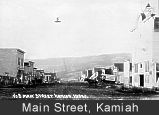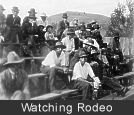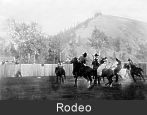| Chapter 15: Back to
Civilization In the early part of September it was considered no longer necessary to guard fires. Indeed, blizzards had already come on the mountain, and we did not wish to be marooned there for the winter. We returned to O'Hara Bar, where I slept in the barn, and the next day started for home. I sent most of my pack by parcel post, and spent two days and a half in all, going the fifty miles. I could have spent the winter in a logging camp up that river, but I was anxious to get to town and see someone besides pioneers. A fair and celebration was held at Kooskia. I took my camera and got some shots in the rodeo they held. The crowd was more interesting than the show, so I took the pictures [below]. There were dances at night, and races in the daytime. The rodeo moved to the metropolis of Kamiah [below, left], a one-street town, but certainly not a one-horse town. There were certainly some beautiful ones, and riders who knew their stuff. The people at Kooskia were most hospitable and pleasant. I could not find a job there, other than stowing smutty barley in a box car at 3 dollars a day. The grain was shot down a high hill in a large pipe, and I had to shovel it away from the spout. There was no chance to get a drink and the air was full of dust so that I had to wear a wet cloth over my nose. No chance to wet it when it got dry. I just couldn't take it, and I quit at noon. From there I went to Spokane. There I found a job working for the O.W.R.&N. Co. railroad for $50.00 a month and expenses while on the road. Tiring of the hotel, I engaged a room with Mrs. McNicholas and daughter of 38 W. 2nd Ave. at $1.50 a week. They made me one of the family, and I found real satisfaction in the thought that I could help them with their man problems, and they did much to reciprocate. One day I met a man on the street who said he was an engineer for Northern Pacific, and that he could get me a better job with them. I quit my job and was to meet him that night to go to Seattle. He borrowed $2.50 of me and said to meet him at a certain hotel. I never saw him again. That was only one gyp scheme I ran into. I don't think any poor Westerners will get taken in New York City. They know the ropes. Jobs were scarce. I finally got one for a lumber company near the Canadian border in Washington. I was to act as bookkeeper, time keeper and log roller. The camp was one that was poorly built. The roof of my shack leaked a river. When I found that the boss got $2.50 a day, and wouldn't tell me what I would get, I tendered an informal resignation, telegraphed home for carfare and walked 9 miles in the rain with an 80-pound pack to the nearest station. I bade a fond farewell to the McNicholas family, and a girl named Burrows whom I had come to know, and headed for home, where my good father had found me another $50.00 a month job for the New York Central. |



